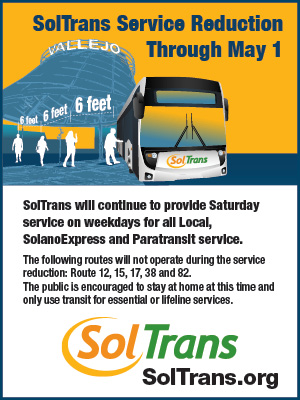The field of Automotive Technology provides for a niche career
By James Quinn
Solano Community College (SCC) has further expanded into Vallejo with its Auto Technology Facility at 1695 Ascot Parkway (at the corner of Ascot and Turner parkways). This beautiful campus opened up just last year, fall semester of 2017, with a grand opening ceremony. More importantly, this Solano Community College Auto Technology Facility paints an exciting picture for the future of Vallejo and our local community, as we move further into the technological age.
With their new facility, SCC promotes the trades in a college setting by giving students the opportunity to major in the field of automotive technology (the study of practical automotive knowledge, hands-on experience, with that of technology). One of the Auto Technology Department’s main goals is to prepare students for working in the field, both during and after the Automotive Technology Program. As their website describes, “This program is designed to prepare graduates for entry-level employment in the automotive industry as apprentice technicians, parts specialists, service consultants, or specialists in one of the many areas in the automotive service and repair industry.” The department is already rated very high online, namely due to their strong faculty of professors who ready students for a respectable career, both during and after the program.
Helping them get there, the program has highly experienced instructors in the automotive technology field: Professor Paul Hidy, Professor Rick Marshall, and Professor Andrew McGee. The instructors have more than just office hours, as they give valuable one-on-one, hands-on training in the campus’ automotive bay shops and classrooms while incorporating technology that goes from basic to cutting-edge. They foster students’ understanding of how things work, organizational skills, oral and written communication skills, problem-solving, innovation, teamwork, and technology skills (to only name a few). “Students who complete the program will be technically proficient in entry-level skills as defined by the National Automotive Technicians Education Foundation,” their website states.
At the time of this article’s writing, the program has a big class close to graduating, according to Professor McGee—and from one educator to another, I could tell he, just as the other professors, is clearly passionate about teaching students and their success in working in the field. “We have several students who are currently working in the automotive field as technicians, service advisors, parts people, etc … at various locations, whether it be at dealerships or independent shops around Solano County and beyond,” Professor McGee said. “Right now, it’s toward the end of our spring semester, so we have several students who are graduating with their Associate’s Degree and/or certificates.”
By attending classes through SCC’s Automotive Technician Program, people can earn various degrees and certificates to get out into the field in only about two years, depending on the specific requirements—which is a lot faster than a four-year college, as well as other programs that often turn into five years or more—and their graduation rate keeps going up. “We have a significant number of students who are completing our program. That number has been increasing since we started,” Professor McGee said.
Some of the degrees and certificates that the Automotive Technology Department offers include, Associate in Science Degree, Certificate of Achievement in Automotive Automatic Transmissions & Transaxles, Certificate of Achievement in Automotive Electrical & Body Systems, and Certificate of Achievement in Automotive Maintenance & Light Repair. They also offer a smog check training for the California Smog Check Inspector licensing exam. Be sure to visit their online catalog for the specific requirements by degree or certificate, conveniently accessed here: solano.edu/catalog.
Fortunately, greater amounts of people in our community recognize this trade of automotive technology as a career choice. While trades are at a national low, efforts by publication, word of mouth, and SCC’s involvement in the community have made a positive difference. “The public is more and more aware that our program exists,” Professor McGee said. “We’ve been taking extensive measures to go out to the high schools and do outreach, and also in our community to help let the public know, ‘Hey, you can get an education that leads to a job and great career in the automotive industry.’” It is indeed a lucrative career choice, as a quick Google search will show for an automotive technician (that position is just one example, depending on the degree and/or certificates earned from the program).
Moreover, we are in the age of educating people to use technology for jobs that do not even exist yet by giving them pertinent skills that can transfer from related fields. Because cars can do so much more than ever before with technology—as seen with electric cars, Internet-connected vehicles, and autonomous cars—and because consumers are more tech-focused, it is especially important to know why pursuing automotive technology is wise in the 21st century. Autonomous cars, for instance, while a trending topic for multiple reasons, they are now far less of an idea than a reality. More people accept that they are here to stay, expedited with technological advancements that ensure greater safety.
The Solano Community College Auto Technology Facility stays up to date with the latest technology to teach students this trade that puts them in a comfortable position. Because most people outside of the automotive industry will not know how to work on cars (vehicles are bound for repairs throughout their driving life); those who do, clearly have the advantage. However, those with automotive technology training and certification from the program have an even better niche since many will not know how to work on cars with particular technology, especially if it just came out.
When weighing out choices for significant life-decisions, SCC’s automotive program is a great investment. Not only is SCC conveniently located in our community—which will not require much of a commute for most—but they also offer more affordable college units (especially as a California resident) than the vast majority of four-year colleges while putting you directly into the field in less amount of time. Another money saver is that since the program teaches how to work on cars of the future, students can independently do more while taking pride in a field that will not require them to constantly hire expensive mechanics down the road, no pun intended. This industry will clearly not die out anytime soon: a career in automotive technology means strong job security, as it will remain at the forefront of society, just as cars and technology are in their own right.
For additional information on the Solano Community College Auto Technology Facility, their Automotive Technology Department, and program visit solano.edu/business/1718/AutoTechflyer2017.pdf; for enrollment information, go to solano.edu/future_students or call Admissions & Records at (707) 864-7171. The new state-of-the-art campus is located on 1695 Ascot Pkwy, Vallejo.
James Quinn lives in Benicia and teaches at Elmer Cave Language Academy in Vallejo. A UC Davis alumnus in English, he now studies education as part of Touro University’s Master’s in Education program. Along with teaching, he tutors and writes often. He is working on a novel that takes place in Benicia. See his website at mrquinnj.weebly.com.





















































